2003年考研英语真题全面解读之阅读理解
考研英语历年阅读理解真题精析--2003年part2
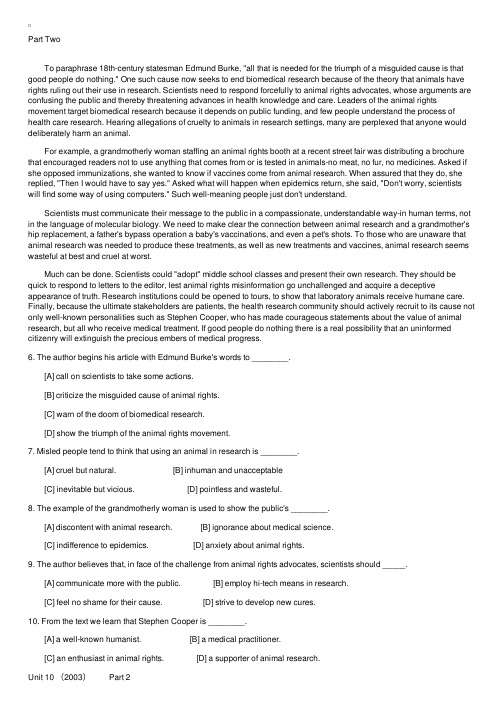
Part Two To paraphrase 18th-century statesman Edmund Burke, "all that is needed for the triumph of a misguided cause is that good people do nothing." One such cause now seeks to end biomedical research because of the theory that animals have rights ruling out their use in research. Scientists need to respond forcefully to animal rights advocates, whose arguments are confusing the public and thereby threatening advances in health knowledge and care. Leaders of the animal rights movement target biomedical research because it depends on public funding, and few people understand the process of health care research. Hearing allegations of cruelty to animals in research settings, many are perplexed that anyone would deliberately harm an animal. For example, a grandmotherly woman staffing an animal rights booth at a recent street fair was distributing a brochure that encouraged readers not to use anything that comes from or is tested in animals-no meat, no fur, no medicines. Asked if she opposed immunizations, she wanted to know if vaccines come from animal research. When assured that they do, she replied, "Then I would have to say yes." Asked what will happen when epidemics return, she said, "Don't worry, scientists will find some way of using computers." Such well-meaning people just don't understand. Scientists must communicate their message to the public in a compassionate, understandable way-in human terms, not in the language of molecular biology. We need to make clear the connection between animal research and a grandmother's hip replacement, a father's bypass operation a baby's vaccinations, and even a pet's shots. To those who are unaware that animal research was needed to produce these treatments, as well as new treatments and vaccines, animal research seems wasteful at best and cruel at worst. Much can be done. Scientists could "adopt" middle school classes and present their own research. They should be quick to respond to letters to the editor, lest animal rights misinformation go unchallenged and acquire a deceptive appearance of truth. Research institutions could be opened to tours, to show that laboratory animals receive humane care. Finally, because the ultimate stakeholders are patients, the health research community should actively recruit to its cause not only well-known personalities such as Stephen Cooper, who has made courageous statements about the value of animal research, but all who receive medical treatment. If good people do nothing there is a real possibility that an uninformed citizenry will extinguish the precious embers of medical progress.6. The author begins his article with Edmund Burke's words to ________. [A] call on scientists to take some actions. [B] criticize the misguided cause of animal rights. [C] warn of the doom of biomedical research. [D] show the triumph of the animal rights movement.7. Misled people tend to think that using an animal in research is ________. [A] cruel but natural. [B] inhuman and unacceptable [C] inevitable but vicious. [D] pointless and wasteful.8. The example of the grandmotherly woman is used to show the public's ________. [A] discontent with animal research. [B] ignorance about medical science. [C] indifference to epidemics. [D] anxiety about animal rights.9. The author believes that, in face of the challenge from animal rights advocates, scientists should _____. [A] communicate more with the public. [B] employ hi-tech means in research. [C] feel no shame for their cause. [D] strive to develop new cures.10. From the text we learn that Stephen Cooper is ________. [A] a well-known humanist. [B] a medical practitioner. [C] an enthusiast in animal rights. [D] a supporter of animal research.Unit 10 (2003) Part 2重点词汇:1. paraphrase(n.v.释意)即para+phrase,para-前缀表“在旁边、辅助”,phrase即“短语;⽤短语表达”,故“⽤短语辅助表达”→释意。
2003年考研英语阅读理解及解析
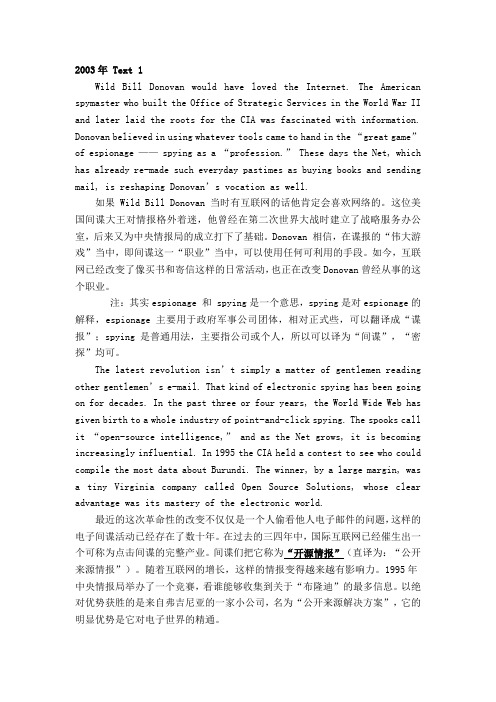
2003年 Text 1Wild Bill Donovan would have loved the Internet. The American spymaster who built the Office of Strategic Services in the World War II and later laid the roots for the CIA was fascinated with information. Donovan believed in using whatever too ls came to hand in the “great game” of espionage ——spying as a “profession.” These days the Net, which has already re-made such everyday pastimes as buying books and sending mail, is reshaping Donovan’s vocation as well.如果Wild Bill Donovan 当时有互联网的话他肯定会喜欢网络的。
这位美国间谍大王对情报格外着迷,他曾经在第二次世界大战时建立了战略服务办公室,后来又为中央情报局的成立打下了基础。
Donovan 相信,在谍报的“伟大游戏”当中,即间谍这一“职业”当中,可以使用任何可利用的手段。
如今,互联网已经改变了像买书和寄信这样的日常活动,也正在改变Donovan曾经从事的这个职业。
注:其实espionage 和 spying是一个意思,spying是对espionage的解释,espionage主要用于政府军事公司团体,相对正式些,可以翻译成“谍报”;spying是普通用法,主要指公司或个人,所以可以译为“间谍”,“密探”均可。
The latest revolution isn’t simply a matter of gentlemen reading other gentlemen’s e-mail. That kind of electronic spying has been going on for decades. In the past three or four years, the World Wide Web has given birth to a whole industry of point-and-click spying. The spooks call it “open-source intelligence,” and as the Net grows, it is becoming increasingly influential. In 1995 the CIA held a contest to see who could compile the most data about Burundi. The winner, by a large margin, was a tiny Virginia company called Open Source Solutions, whose clear advantage was its mastery of the electronic world.最近的这次革命性的改变不仅仅是一个人偷看他人电子邮件的问题,这样的电子间谍活动已经存在了数十年。
2003年考研英语阅读理解及解析

2003年 Text 1Wild Bill Donovan would have loved the Internet. The American spymaster who built the Office of Strategic Services in the World War II and later laid the roots for the CIA was fascinated with information. Donovan believed in using whatever too ls came to hand in the “great game” of espionage ——spying as a “profession.” These days the Net, which has already re-made such everyday pastimes as buying books and sending mail, is reshaping Donovan’s vocation as well.如果Wild Bill Donovan 当时有互联网的话他肯定会喜欢网络的。
这位美国间谍大王对情报格外着迷,他曾经在第二次世界大战时建立了战略服务办公室,后来又为中央情报局的成立打下了基础。
Donovan 相信,在谍报的“伟大游戏”当中,即间谍这一“职业”当中,可以使用任何可利用的手段。
如今,互联网已经改变了像买书和寄信这样的日常活动,也正在改变Donovan曾经从事的这个职业。
注:其实espionage 和 spying是一个意思,spying是对espionage的解释,espionage主要用于政府军事公司团体,相对正式些,可以翻译成“谍报”;spying是普通用法,主要指公司或个人,所以可以译为“间谍”,“密探”均可。
The latest revolution isn’t simply a matter of gentlemen reading other gentlemen’s e-mail. That kind of electronic spying has been going on for decades. In the past three or four years, the World Wide Web has given birth to a whole industry of point-and-click spying. The spooks call it “open-source intelligence,” and as the Net grows, it is becoming increasingly influential. In 1995 the CIA held a contest to see who could compile the most data about Burundi. The winner, by a large margin, was a tiny Virginia company called Open Source Solutions, whose clear advantage was its mastery of the electronic world.最近的这次革命性的改变不仅仅是一个人偷看他人电子邮件的问题,这样的电子间谍活动已经存在了数十年。
2003年考研英语真题及解析(黄皮书)
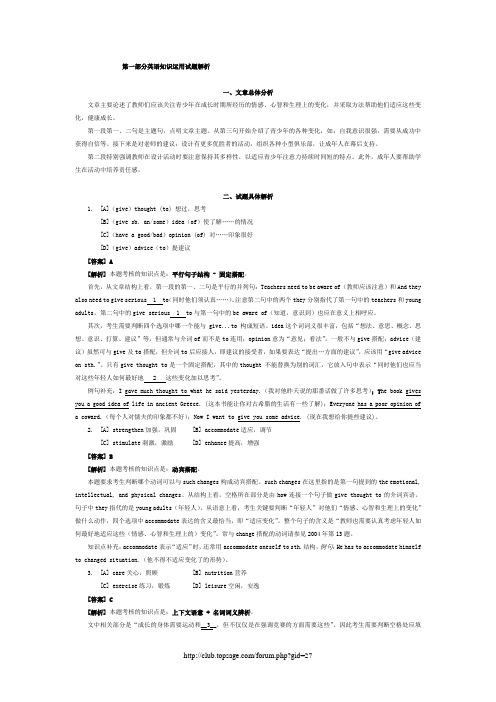
第一部分英语知识运用试题解析一、文章总体分析文章主要论述了教师们应该关注青少年在成长时期所经历的情感、心智和生理上的变化,并采取方法帮助他们适应这些变化,健康成长。
第一段第一、二句是主题句,点明文章主题。
从第三句开始介绍了青少年的各种变化,如:自我意识很强,需要从成功中获得自信等。
接下来是对老师的建议:设计有更多优胜者的活动,组织各种小型俱乐部,让成年人在幕后支持。
第二段特别强调教师在设计活动时要注意保持其多样性,以适应青少年注意力持续时间短的特点。
此外,成年人要帮助学生在活动中培养责任感。
二、试题具体解析1. [A](give)thought (to) 想过,思考[B](give sb. an/some)idea(of)使了解……的情况[C](have a good/bad)opinion (of) 对……印象很好[D](give)advice(to)提建议[答案] A[解析]本题考核的知识点是:平行句子结构+ 固定搭配。
首先,从文章结构上看,第一段的第一、二句是平行的并列句:Teachers need to be aware of(教师应该注意)和And they also need to give serious 1 to(同时他们须认真……)。
注意第二句中的两个they分别指代了第一句中的teachers和young adults,第二句中的give serious 1 to与第一句中的be aware of(知道,意识到)也应在意义上相呼应。
其次,考生需要判断四个选项中哪一个能与 give...to 构成短语。
idea这个词词义很丰富,包括“想法、意思、概念、思想、意识、打算、建议”等,但通常与介词of而不是to连用;opinion意为“意见;看法”,一般不与give搭配;advice(建议)虽然可与give及to搭配,但介词to后应接人,即建议的接受者,如果要表达“提出…方面的建议”,应该用“give advice on sth.”。
考研英语2003年第三篇阅读
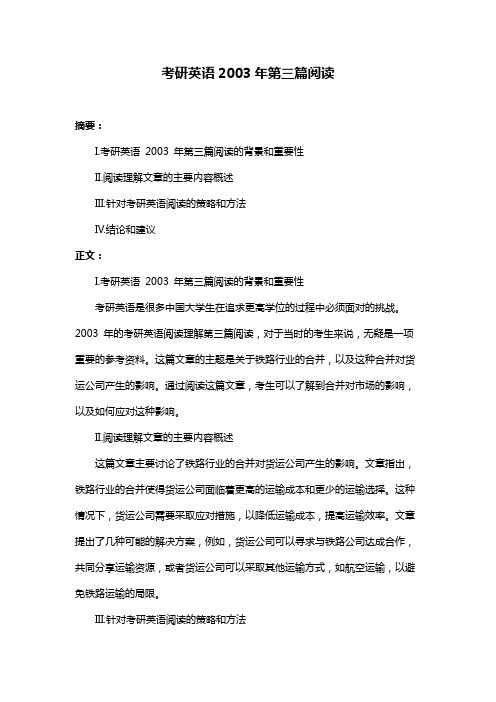
考研英语2003年第三篇阅读摘要:I.考研英语2003 年第三篇阅读的背景和重要性II.阅读理解文章的主要内容概述III.针对考研英语阅读的策略和方法IV.结论和建议正文:I.考研英语2003 年第三篇阅读的背景和重要性考研英语是很多中国大学生在追求更高学位的过程中必须面对的挑战。
2003 年的考研英语阅读理解第三篇阅读,对于当时的考生来说,无疑是一项重要的参考资料。
这篇文章的主题是关于铁路行业的合并,以及这种合并对货运公司产生的影响。
通过阅读这篇文章,考生可以了解到合并对市场的影响,以及如何应对这种影响。
II.阅读理解文章的主要内容概述这篇文章主要讨论了铁路行业的合并对货运公司产生的影响。
文章指出,铁路行业的合并使得货运公司面临着更高的运输成本和更少的运输选择。
这种情况下,货运公司需要采取应对措施,以降低运输成本,提高运输效率。
文章提出了几种可能的解决方案,例如,货运公司可以寻求与铁路公司达成合作,共同分享运输资源,或者货运公司可以采取其他运输方式,如航空运输,以避免铁路运输的局限。
III.针对考研英语阅读的策略和方法针对考研英语阅读,有以下几点策略和方法可以提高阅读效率和理解能力:1.提前预习:在阅读文章之前,先浏览题目,了解文章的大致内容和结构,这样在阅读时可以更有针对性地寻找答案。
2.划重点:在阅读过程中,划出关键词和句子,帮助理解和记忆。
3.多次阅读:对于难以理解的文章,可以尝试多次阅读,每次阅读都有不同的侧重,逐渐提高理解程度。
4.做笔记:在阅读过程中,记录下关键信息和自己的思考,有助于整理思路和回顾复习。
IV.结论和建议总之,考研英语阅读理解是考研英语的重要组成部分,需要认真对待。
通过针对性的策略和方法,可以提高阅读效率和理解能力,为考研英语取得好成绩奠定基础。
2003年考研英语真题解析之阅读理解
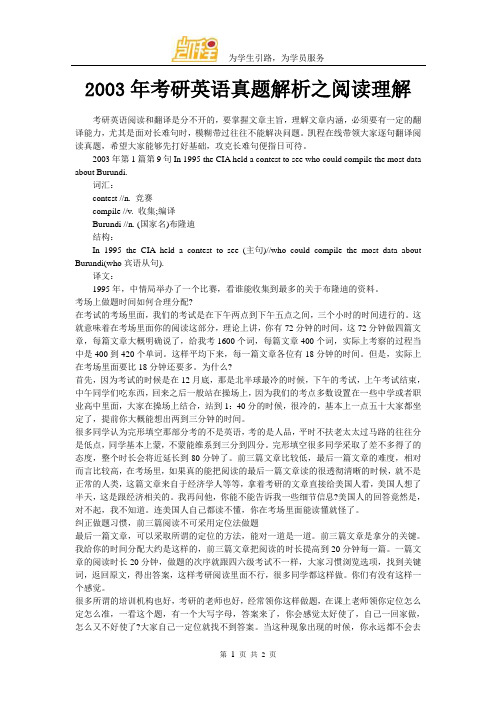
2003年考研英语真题解析之阅读理解考研英语阅读和翻译是分不开的,要掌握文章主旨,理解文章内涵,必须要有一定的翻译能力,尤其是面对长难句时,模糊带过往往不能解决问题。
凯程在线带领大家逐句翻译阅读真题,希望大家能够先打好基础,攻克长难句便指日可待。
2003年第1篇第9句In 1995 the CIA held a contest to see who could compile the most data about Burundi.词汇:contest //n. 竞赛compile //v. 收集;编译Burundi //n. (国家名)布隆迪结构:In 1995 the CIA held a contest to see (主句)//who could compile the most data about Burundi(who宾语从句).译文:1995年,中情局举办了一个比赛,看谁能收集到最多的关于布隆迪的资料。
考场上做题时间如何合理分配?在考试的考场里面,我们的考试是在下午两点到下午五点之间,三个小时的时间进行的。
这就意味着在考场里面你的阅读这部分,理论上讲,你有72分钟的时间,这72分钟做四篇文章,每篇文章大概明确说了,给我考1600个词,每篇文章400个词,实际上考察的过程当中是400到420个单词。
这样平均下来,每一篇文章各位有18分钟的时间。
但是,实际上在考场里面要比18分钟还要多。
为什么?首先,因为考试的时候是在12月底,那是北半球最冷的时候,下午的考试,上午考试结束,中午同学们吃东西,回来之后一般站在操场上,因为我们的考点多数设置在一些中学或者职业高中里面,大家在操场上结合,站到1:40分的时候,很冷的,基本上一点五十大家都坐定了,提前你大概能想出两到三分钟的时间。
很多同学认为完形填空那部分考的不是英语,考的是人品,平时不扶老太太过马路的往往分是低点,同学基本上蒙,不蒙能维系到三分到四分。
2003年考研英语真题及解析

2003年全国攻读硕士学位研究生入学考试英语试题第一部分英语知识运用试题解析一、文章总体分析文章主要论述了教师们应该关注青少年在成长时期所经历的情感、心智和生理上的变化,并采取方法帮助他们适应这些变化,健康成长。
第一段第一、二句是主题句,点明文章主题。
从第三句开始介绍了青少年的各种变化,如:自我意识很强,需要从成功中获得自信等。
接下来是对老师的建议:设计有更多优胜者的活动,组织各种小型俱乐部,让成年人在幕后支持。
第二段特别强调教师在设计活动时要注意保持其多样性,以适应青少年注意力持续时间短的特点。
此外,成年人要帮助学生在活动中培养责任感。
二、试题具体解析1. [A](give)thought (to) 想过,思考[B](give sb. an/some)idea(of)使了解……的情况[C](have a good/bad)opinion (of) 对……印象很好[D](give)advice(to)提建议[答案] A[解析]本题考核的知识点是:平行句子结构+ 固定搭配。
首先,从文章结构上看,第一段的第一、二句是平行的并列句:Teachers need to be aware of(教师应该注意)和And they also need to give serious 1 to(同时他们须认真……)。
注意第二句中的两个they分别指代了第一句中的teachers和young adults,第二句中的give serious 1 to与第一句中的be aware of(知道,意识到)也应在意义上相呼应。
其次,考生需要判断四个选项中哪一个能与 give...to 构成短语。
idea这个词词义很丰富,包括“想法、意思、概念、思想、意识、打算、建议”等,但通常与介词of而不是to连用;opinion意为“意见;看法”,一般不与give搭配;advice(建议)虽然可与give 及to搭配,但介词to后应接人,即建议的接受者,如果要表达“提出…方面的建议”,应该用“give advice on sth.”。
2003年考研英语阅读彻底解析带作文佳句

2003年考研英语阅读彻底解析带作文佳句全文共3篇示例,供读者参考篇12003年考研英语阅读彻底解析带作文佳句In 2003, the Graduate Entrance Exam for English Reading in China was a challenging one. Students faced difficult texts and complex questions in order to test their comprehension and critical thinking skills. In this article, we will provide a thorough analysis of the reading section of the 2003 exam, along with some useful tips and examples of writing sentences.The reading section of the 2003 exam consisted of multiple passages on a variety of topics, ranging from literature to science to history. Each passage was followed by a series of questions that required students to identify key information, make inferences, and evaluate arguments. To successfully navigate this section, students needed to have a strong grasp of English vocabulary, grammar, and reading comprehension skills.One common type of question in the 2003 exam asked students to identify the main idea of a passage or a specific paragraph. For example, in a passage about the impact oftechnology on society, students might be asked to explain the author's main argument and provide evidence to support it. To answer this type of question effectively, students needed to carefully read the passage, identify the author's key points, and use these points to formulate a clear and concise response.Another type of question in the 2003 exam required students to make connections between different parts of a passage or between different passages. For example, in a passage about the causes of climate change, students might be asked to compare and contrast the arguments of two different authors and evaluate the strength of their evidence. To answer this type of question, students needed to carefully analyze the text, identify similarities and differences, and draw logical conclusions based on the evidence presented.In addition to these types of questions, the 2003 exam also included questions that tested students' ability to identify the tone, purpose, and audience of a passage. For example, in a passage about the history of the English language, students might be asked to explain why the author chose to focus on a particular time period and how this choice shaped the overall argument of the passage. To answer this type of question, students needed to consider the author's language, style, andrhetorical strategies, as well as the context in which the passage was written.Overall, the 2003 Graduate Entrance Exam for English Reading was a challenging test that required students to demonstrate a high level of reading comprehension and critical thinking skills. To succeed on this exam, students needed to carefully read and analyze the passages, identify key information, and use this information to answer a variety of questions. By studying past exams, practicing reading comprehension strategies, and building vocabulary and grammar skills, students could improve their performance on the exam and achieve their academic goals.In conclusion, the 2003 Graduate Entrance Exam for English Reading was a challenging test that required students to demonstrate a high level of reading comprehension and critical thinking skills. By carefully reading and analyzing passages, identifying key information, and using this information to answer a variety of questions, students could improve their performance on the exam and achieve their academic goals. With dedication and hard work, students could successfully navigate the reading section of the exam and excel in their graduate studies.Some example sentences for writing practice:1. The impact of technology on society is a topic of ongoing debate, with proponents and opponents arguing over its benefits and drawbacks.2. Climate change is a complex issue that requires a global response, as the consequences of inaction are dire.3. The history of the English language is a fascinating subject that reveals the evolution of communication and culture over time.4. To succeed on the Graduate Entrance Exam for English Reading, students must develop strong reading comprehension and critical thinking skills through practice and dedication.Overall, the 2003 Graduate Entrance Exam for English Reading was a challenging test that required students to demonstrate a high level of reading comprehension and critical thinking skills. With careful preparation and practice, students could improve their performance on the exam and achieve their academic goals.篇22003年考研英语阅读彻底解析带作文佳句In 2003, the English reading section of the postgraduate entrance exam was a challenge that many candidates faced. The reading comprehension questions required not only a deep understanding of the text but also critical thinking skills to analyze and interpret the information provided.One key aspect of tackling the reading comprehension section is to carefully read and understand the passage before attempting to answer the questions. This involves identifying the main idea, supporting details, and any key points or arguments presented in the text. It is also important to pay attention to the tone and style of the passage, as this can provide clues to help answer the questions.Furthermore, it is essential to practice reading a variety of texts in English to improve comprehension skills. This can include reading newspapers, magazines, academic articles, and literary works. By exposing oneself to a range of topics and writing styles, candidates can become more adept at extracting information and making connections between different pieces of text.In addition to improving reading comprehension skills, candidates should also focus on developing their writing abilities. The essay section of the postgraduate entrance exam requires candidates to articulate their thoughts and arguments clearlyand coherently. To achieve this, candidates should practice organizing their ideas, structuring their essays effectively, and using appropriate language and vocabulary.One useful strategy for writing essays is to start with a clear thesis statement that outlines the main argument or point of view. This can help guide the rest of the essay and ensure that all points made are relevant and support the main argument. Candidates should also use evidence and examples to back up their claims and establish credibility in their writing.Additionally, candidates should pay attention to grammar, punctuation, and spelling in their writing to ensure that their essays are clear and easy to read. Proofreading is essential to catch any errors and make sure that the essay is polished and professional.To further enhance their writing skills, candidates can also study model essays and analyze their structure, argumentation, and use of language. By taking note of effective writing techniques and incorporating them into their own writing, candidates can improve their essay writing abilities and increase their chances of success in the postgraduate entrance exam.Overall, mastering the reading comprehension and essay writing sections of the postgraduate entrance exam requirespractice, perseverance, and dedication. By developing strong reading comprehension skills and honing their writing abilities, candidates can increase their chances of achieving a high score and ultimately succeed in the exam. With hard work and determination, candidates can overcome the challenges of the exam and achieve their academic goals.篇32003年考研英语阅读彻底解析带作文佳句In the year 2003, the English reading section of the postgraduate entrance examination was thoroughly analyzed with a focus on providing example sentences for writing practice. This section is one of the most challenging parts of the exam, as it requires candidates to comprehend and analyze complex passages within a limited time frame.The reading comprehension section typically consists of multiple passages, each followed by a series of questions that test the candidate's ability to understand and interpret the text. To excel in this section, candidates must have a strong grasp of English vocabulary, grammar, and reading skills.One key strategy for approaching the reading comprehension section is to read the questions first beforediving into the passage. This can help candidates identify key information and focus their attention on relevant details while reading. Additionally, it is essential to take notes while reading to ensure a thorough understanding of the passage.Another important aspect of preparing for the reading comprehension section is to practice writing essays using example sentences provided in the study materials. This can help candidates improve their writing skills and learn how to incorporate complex vocabulary and grammar structures into their essays.Overall, the key to success in the reading comprehension section of the postgraduate entrance examination lies in thorough preparation and practice. By studying example sentences, practicing writing essays, and honing reading skills, candidates can increase their chances of achieving a high score in this challenging section of the exam.In conclusion, the year 2003 saw a focus on providing a comprehensive analysis of the reading comprehension section of the postgraduate entrance examination, along with example sentences for writing practice. By following key strategies and practicing diligently, candidates can improve their performancein this crucial part of the exam. Good luck to all candidates preparing for the exam!。
2003考研英语解析

2003考研英语解析1. Part APart A of the 2003 Graduate Entrance Examination in English (GEEE) consisted of multiple-choice questions that assessed the test taker’s ability in areas such as vocabulary, grammar, and reading comprehension.1.1 VocabularyThe vocabulary section of Part A had 20 questions. It assessed the test taker’s knowledge and understanding of English words and phrases. The questions ranged from synonyms and antonyms to idioms and collocations. It was important for the test taker to have a strong vocabulary in order to do well in this section.1.2 GrammarThe grammar section of Part A had 20 questions. It assessed the test taker’s knowledge and understanding of English grammar rules. The questions covered various topics such as tenses, verb forms, sentence structure, and word usage. It was crucial for the test taker to have a solid understanding of English grammar in order to answer these questions accurately.1.3 Reading ComprehensionThe reading comprehension section of Part A had 30 questi ons. It assessed the test taker’s ability to understand andinterpret written English passages. The passages ranged from short newspaper articles to longer academic texts. The test taker had to read the passages carefully and answer questions based on the information provided in the text. Strong reading comprehension skills were essential to perform well in this section.2. Part BPart B of the 2003 GEEE consisted of translation and writing tasks. The test taker had to translate a given English passage into Chinese and write an essay on a given topic.2.1 TranslationThe translation task required the test taker to translate a short English passage into Chinese. The passage tested the test taker’s ability to accurately convey the meaning of the original text in another language. It was important for the test taker to have a good knowledge of English and Chinese vocabulary and grammar in order to successfully complete this task.2.2 WritingThe writing task required the test taker to write an essay on a given topic. The test taker had to express their thoughts and opinions in a clear and coherent manner. The essay was expected to have a well-structured introduction, body paragraphs, and conclusion. It was important for the test taker to plan and organize their essay before writing and to use appropriate vocabulary and grammar throughout.3. Preparation TipsHere are some tips to help you prepare for the 2003 GEEE in English:1.Expand your vocabulary: Read English books,articles, and newspapers to improve your vocabulary. Makea list of new words and review them regularly.2.Practice grammar exercises: Solve grammarexercises to improve your understanding of Englishgrammar rules. Focus on areas that you find difficult andseek help if needed.3.Improve reading comprehension skills: Read Englishpassages and practice answering questions based on them.Pay attention to the main ideas, supporting details, and the overall message of the text.4.Practice translation: Practice translating Englishpassages into Chinese to improve your translation skills.Pay attention to accuracy and try to convey the originalmeaning as closely as possible.5.Develop writing skills: Practice writing essays onvarious topics to improve your writing skills. Pay attention to structure, coherence, and using appropriate vocabulary and grammar.6.Take mock tests: Take simulated exams tofamiliarize yourself with the test format and timeconstraints. This will help you build confidence andimprove your performance under exam conditions.Remember to allocate sufficient time for each section, read the instructions carefully, and manage your time effectively during the exam.Good luck with your preparation for the 2003 GEEE in English!。
2003考研英语阅读理解第一篇

2003考研英语阅读理解第一篇
【实用版】
目录
1.2003 年考研英语阅读理解第一篇概述
2.文章主要内容
3.文章结构和重点单词
正文
一、2003 年考研英语阅读理解第一篇概述
2003 年考研英语阅读理解第一篇是一篇关于美国情报机构历史的文章。
文章通过讲述美国情报机构在二战期间和战后的发展,以及其对互联网的贡献,旨在让读者了解美国情报机构的历史和作用。
二、文章主要内容
文章主要分为两个部分,第一部分讲述了美国情报机构在二战期间的创立和发展,第二部分讲述了美国情报机构在战后的发展和对互联网的贡献。
1.美国情报机构在二战期间的创立和发展
文章开头提到了美国情报机构的创始人——威廉·多诺万(William Donovan),他是一位对情报工作充满热情的美国将军。
在二战期间,他创建了战略服务办公室(Office of Strategic Services,简称 OSS),这
是美国情报机构的前身。
OSS 在战争期间为美国提供了重要的情报支持,为盟军在战争中取得胜利做出了巨大贡献。
2.美国情报机构在战后的发展和对互联网的贡献
二战结束后,OSS 被中央情报局(CIA)所取代,成为美国情报机构
的核心部门。
文章中提到,CIA 对互联网的发展做出了重要贡献。
首先,CIA 投资了许多与互联网技术相关的研究项目,推动了互联网技术的发展。
其次,CIA 通过其分支机构,与其他国家情报机构合作,共同推动了互联网在全球范围内的普及。
三、文章结构和重点单词
文章结构清晰,分为两个部分,分别讲述了美国情报机构在二战期间的创立和发展,以及战后的发展和对互联网的贡献。
2003年考研英语阅读第二篇
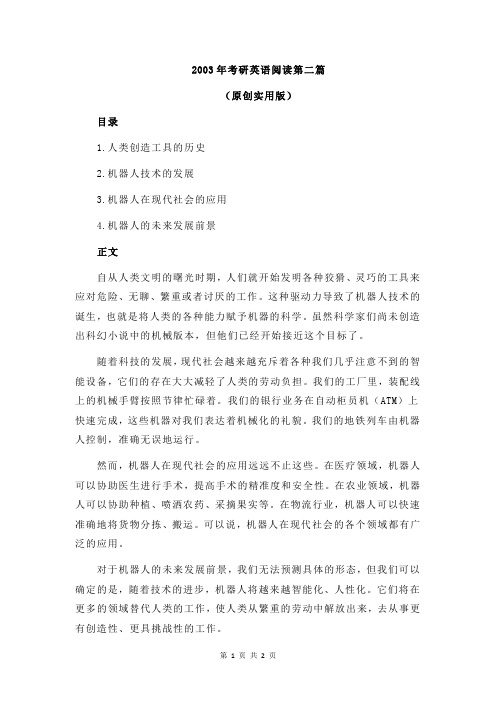
2003年考研英语阅读第二篇
(原创实用版)
目录
1.人类创造工具的历史
2.机器人技术的发展
3.机器人在现代社会的应用
4.机器人的未来发展前景
正文
自从人类文明的曙光时期,人们就开始发明各种狡猾、灵巧的工具来应对危险、无聊、繁重或者讨厌的工作。
这种驱动力导致了机器人技术的诞生,也就是将人类的各种能力赋予机器的科学。
虽然科学家们尚未创造出科幻小说中的机械版本,但他们已经开始接近这个目标了。
随着科技的发展,现代社会越来越充斥着各种我们几乎注意不到的智能设备,它们的存在大大减轻了人类的劳动负担。
我们的工厂里,装配线上的机械手臂按照节律忙碌着。
我们的银行业务在自动柜员机(ATM)上快速完成,这些机器对我们表达着机械化的礼貌。
我们的地铁列车由机器人控制,准确无误地运行。
然而,机器人在现代社会的应用远远不止这些。
在医疗领域,机器人可以协助医生进行手术,提高手术的精准度和安全性。
在农业领域,机器人可以协助种植、喷洒农药、采摘果实等。
在物流行业,机器人可以快速准确地将货物分拣、搬运。
可以说,机器人在现代社会的各个领域都有广泛的应用。
对于机器人的未来发展前景,我们无法预测具体的形态,但我们可以确定的是,随着技术的进步,机器人将越来越智能化、人性化。
它们将在更多的领域替代人类的工作,使人类从繁重的劳动中解放出来,去从事更有创造性、更具挑战性的工作。
2003考研英语阅读解析

2003考研英语阅读解析在2003年的考研英语阅读部分,考生们面临的是一系列精心设计的文章,旨在测试他们的阅读理解能力、词汇量以及对复杂句型的理解。
这些文章通常涉及多个领域,包括社会科学、自然科学、人文学科等,要求考生不仅要有广泛的知识面,还要能够快速准确地捕捉和分析信息。
文章的结构通常清晰,每篇阅读材料都包含一个主题句,随后是支持细节和例证。
考生需要通过理解这些句子和段落之间的关系,来把握文章的主旨大意。
此外,文章中常常包含一些长难句,这些句子结构复杂,词汇量大,对考生的语法和词汇掌握提出了较高的要求。
在解答阅读理解题目时,考生首先需要快速浏览文章,抓住文章的主旨大意。
接着,仔细阅读每个段落,理解段落之间的逻辑关系,以及每个段落如何支持文章的中心论点。
在阅读过程中,考生应该学会识别关键词汇和短语,这些往往是理解文章和回答问题的关键。
在2003年的考研英语阅读中,题目类型多样,包括细节理解题、推理判断题、词义猜测题和主旨大意题等。
这些题目要求考生不仅要理解文章的字面意思,还要能够推断作者的意图、态度以及文章的深层含义。
对于细节理解题,考生需要仔细阅读文章中的每个细节,确保对文章的具体信息有准确的把握。
推理判断题则要求考生在理解文章的基础上,进行逻辑推理,得出合理的结论。
词义猜测题考验考生对词汇的掌握程度,要求考生能够根据上下文推断出生词或短语的含义。
而主旨大意题则要求考生能够从整体上把握文章的中心思想。
在准备考研英语阅读时,考生应该广泛阅读各种类型的英文材料,提高自己的阅读速度和理解能力。
同时,通过练习历年的考研英语真题,熟悉题型和答题技巧,也是提高阅读成绩的有效方法。
此外,考生还应该注意培养自己的逻辑思维能力,这对于理解和分析文章内容至关重要。
总之,2003年的考研英语阅读部分是对考生英语综合运用能力的一次全面考验。
通过有效的阅读策略和大量的实践练习,考生可以提高自己的阅读水平,从而在考试中取得优异的成绩。
03年考研英语一阅读
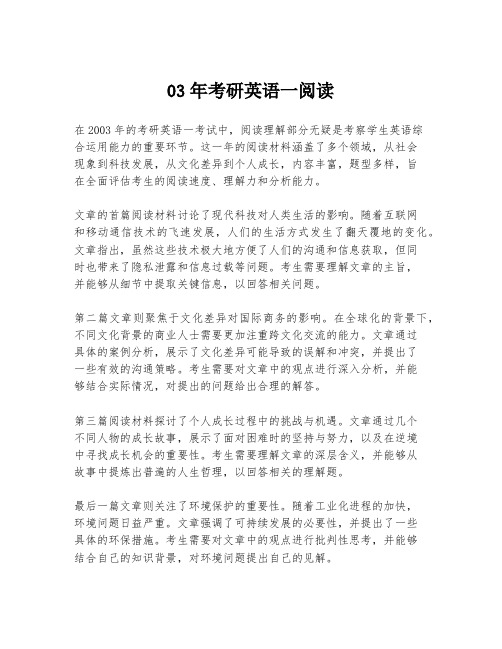
03年考研英语一阅读在2003年的考研英语一考试中,阅读理解部分无疑是考察学生英语综合运用能力的重要环节。
这一年的阅读材料涵盖了多个领域,从社会现象到科技发展,从文化差异到个人成长,内容丰富,题型多样,旨在全面评估考生的阅读速度、理解力和分析能力。
文章的首篇阅读材料讨论了现代科技对人类生活的影响。
随着互联网和移动通信技术的飞速发展,人们的生活方式发生了翻天覆地的变化。
文章指出,虽然这些技术极大地方便了人们的沟通和信息获取,但同时也带来了隐私泄露和信息过载等问题。
考生需要理解文章的主旨,并能够从细节中提取关键信息,以回答相关问题。
第二篇文章则聚焦于文化差异对国际商务的影响。
在全球化的背景下,不同文化背景的商业人士需要更加注重跨文化交流的能力。
文章通过具体的案例分析,展示了文化差异可能导致的误解和冲突,并提出了一些有效的沟通策略。
考生需要对文章中的观点进行深入分析,并能够结合实际情况,对提出的问题给出合理的解答。
第三篇阅读材料探讨了个人成长过程中的挑战与机遇。
文章通过几个不同人物的成长故事,展示了面对困难时的坚持与努力,以及在逆境中寻找成长机会的重要性。
考生需要理解文章的深层含义,并能够从故事中提炼出普遍的人生哲理,以回答相关的理解题。
最后一篇文章则关注了环境保护的重要性。
随着工业化进程的加快,环境问题日益严重。
文章强调了可持续发展的必要性,并提出了一些具体的环保措施。
考生需要对文章中的观点进行批判性思考,并能够结合自己的知识背景,对环境问题提出自己的见解。
总的来说,2003年考研英语一的阅读理解部分不仅考察了考生的英语阅读能力,还考察了他们对不同领域的理解和分析能力。
通过这些精心设计的文章和问题,考生的英语水平和综合素质得到了全面的评估。
2003考研英语阅读理解第一篇
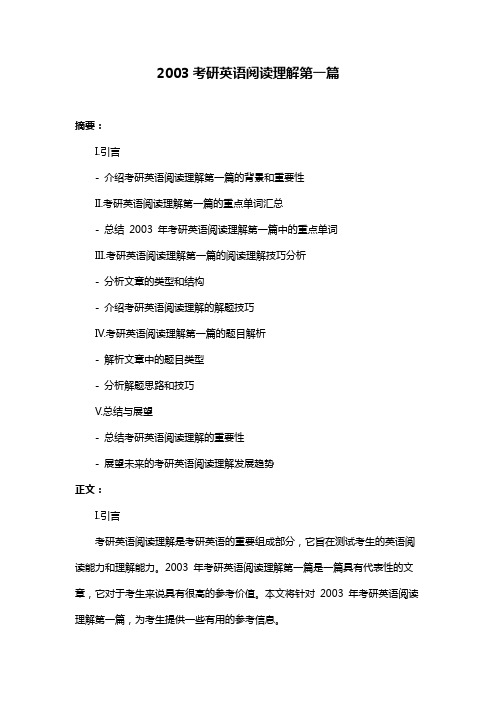
2003考研英语阅读理解第一篇摘要:I.引言- 介绍考研英语阅读理解第一篇的背景和重要性II.考研英语阅读理解第一篇的重点单词汇总- 总结2003 年考研英语阅读理解第一篇中的重点单词III.考研英语阅读理解第一篇的阅读理解技巧分析- 分析文章的类型和结构- 介绍考研英语阅读理解的解题技巧IV.考研英语阅读理解第一篇的题目解析- 解析文章中的题目类型- 分析解题思路和技巧V.总结与展望- 总结考研英语阅读理解的重要性- 展望未来的考研英语阅读理解发展趋势正文:I.引言考研英语阅读理解是考研英语的重要组成部分,它旨在测试考生的英语阅读能力和理解能力。
2003 年考研英语阅读理解第一篇是一篇具有代表性的文章,它对于考生来说具有很高的参考价值。
本文将针对2003 年考研英语阅读理解第一篇,为考生提供一些有用的参考信息。
II.考研英语阅读理解第一篇的重点单词汇总在2003 年考研英语阅读理解第一篇中,有一些重点单词值得考生特别关注。
以下是这些单词的汇总:1.wild2.bill3.donovan4.would5.have6.loved7.the8.internet9.american10.spymaster11.office12.strategic13.services14.world15.warterid18.roots19.cia20.fascinationrmaIII.考研英语阅读理解第一篇的阅读理解技巧分析在阅读2003 年考研英语阅读理解第一篇时,考生需要掌握一些阅读理解技巧,以便更好地理解文章。
以下是这些技巧的分析:1.文章类型和结构:文章主要分为引言、正文和结论三部分。
考生需要通过阅读引言和结论,了解文章的主旨和作者的观点。
2.解题技巧:在阅读理解题目中,通常会有一些关键词和信号词,考生需要通过这些关键词和信号词,推断出题目的答案。
IV.考研英语阅读理解第一篇的题目解析在2003 年考研英语阅读理解第一篇中,有一些题目需要考生特别注意。
考研英语历年阅读理解真题精析--2003年part4
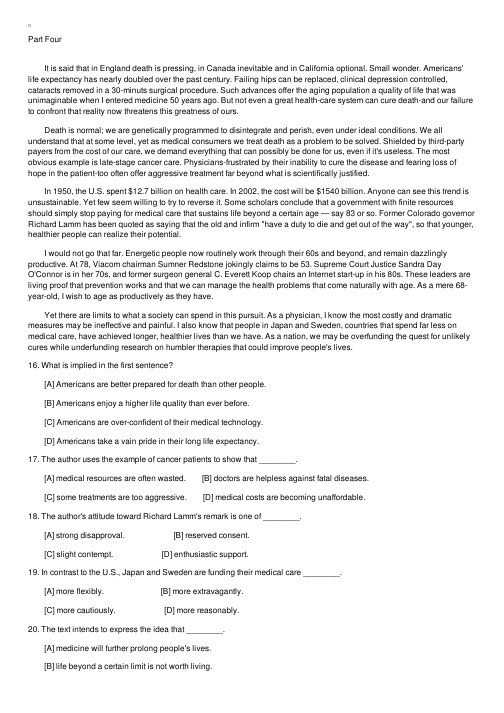
Part Four It is said that in England death is pressing, in Canada inevitable and in California optional. Small wonder. Americans' life expectancy has nearly doubled over the past century. Failing hips can be replaced, clinical depression controlled, cataracts removed in a 30-minuts surgical procedure. Such advances offer the aging population a quality of life that was unimaginable when I entered medicine 50 years ago. But not even a great health-care system can cure death-and our failure to confront that reality now threatens this greatness of ours. Death is normal; we are genetically programmed to disintegrate and perish, even under ideal conditions. We all understand that at some level, yet as medical consumers we treat death as a problem to be solved. Shielded by third-party payers from the cost of our care, we demand everything that can possibly be done for us, even if it's useless. The most obvious example is late-stage cancer care. Physicians-frustrated by their inability to cure the disease and fearing loss of hope in the patient-too often offer aggressive treatment far beyond what is scientifically justified. In 1950, the U.S. spent $12.7 billion on health care. In 2002, the cost will be $1540 billion. Anyone can see this trend is unsustainable. Yet few seem willing to try to reverse it. Some scholars conclude that a government with finite resources should simply stop paying for medical care that sustains life beyond a certain age — say 83 or so. Former Colorado governor Richard Lamm has been quoted as saying that the old and infirm "have a duty to die and get out of the way", so that younger, healthier people can realize their potential. I would not go that far. Energetic people now routinely work through their 60s and beyond, and remain dazzlingly productive. At 78, Viacom chairman Sumner Redstone jokingly claims to be 53. Supreme Court Justice Sandra DayO'Connor is in her 70s, and former surgeon general C. Everett Koop chairs an Internet start-up in his 80s. These leaders are living proof that prevention works and that we can manage the health problems that come naturally with age. As a mere 68-year-old, I wish to age as productively as they have. Yet there are limits to what a society can spend in this pursuit. As a physician, I know the most costly and dramatic measures may be ineffective and painful. I also know that people in Japan and Sweden, countries that spend far less on medical care, have achieved longer, healthier lives than we have. As a nation, we may be overfunding the quest for unlikely cures while underfunding research on humbler therapies that could improve people's lives.16. What is implied in the first sentence? [A] Americans are better prepared for death than other people. [B] Americans enjoy a higher life quality than ever before. [C] Americans are over-confident of their medical technology. [D] Americans take a vain pride in their long life expectancy.17. The author uses the example of cancer patients to show that ________. [A] medical resources are often wasted. [B] doctors are helpless against fatal diseases. [C] some treatments are too aggressive. [D] medical costs are becoming unaffordable.18. The author's attitude toward Richard Lamm's remark is one of ________. [A] strong disapproval. [B] reserved consent. [C] slight contempt. [D] enthusiastic support.19. In contrast to the U.S., Japan and Sweden are funding their medical care ________. [A] more flexibly. [B] more extravagantly. [C] more cautiously. [D] more reasonably.20. The text intends to express the idea that ________. [A] medicine will further prolong people's lives. [B] life beyond a certain limit is not worth living. [C] death should be accepted as a fact of life. [D] excessive demands increase the cost of health care.Unit 10 (2003) Part 4重点词汇:1. inevitable(不可避免的;必然的)←in+evitable,in-否定前缀,evitable=avoidable可避免的。
2013年考研英语第1篇阅读理解
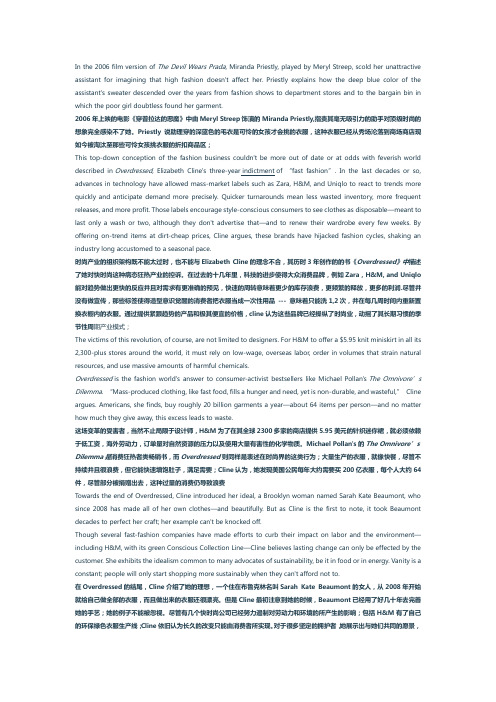
In the 2006 film version of The Devil Wears Prada, Miranda Priestly, played by Meryl Streep, scold her unattractive assistant for imagining that high fashion doesn't affect her. Priestly explains how the deep blue color of the assistant's sweater descended over the years from fashion shows to department stores and to the bargain bin in which the poor girl doubtless found her garment.2006年上映的电影《穿普拉达的恶魔》中由Meryl Streep饰演的Miranda Priestly,指责其毫无吸引力的助手对顶级时尚的想象完全感染不了她。
Priestly 说助理穿的深蓝色的毛衣是可怜的女孩才会挑的衣服,这种衣服已经从秀场沦落到商场商店现如今被淘汰至那些可怜女孩挑衣服的折扣商品区;This top-down conception of the fashion business couldn't be more out of date or at odds with feverish world described in Overdressed, Elizabeth Cline's three-year indictment of “fast fashion”. In the last decades or so, advances in technology have allowed mass-market labels such as Zara, H&M, and Uniqlo to react to trends more quickly and anticipate demand more precisely. Quicker turnarounds mean less wasted inventory, more frequent releases, and more profit. Those labels encourage style-conscious consumers to see clothes as disposable—meant to last only a wash or two, although they don't advertise that—and to renew their wardrobe every few weeks. By offering on-trend items at dirt-cheap prices, Cline argues, these brands have hijacked fashion cycles, shaking an industry long accustomed to a seasonal pace.时尚产业的组织架构既不能太过时,也不能与Elizabeth Cline的理念不合,其历时3年创作的的书《Overdressed》中描述了她对快时尚这种病态狂热产业的控诉。
2003英语考研真题阅读
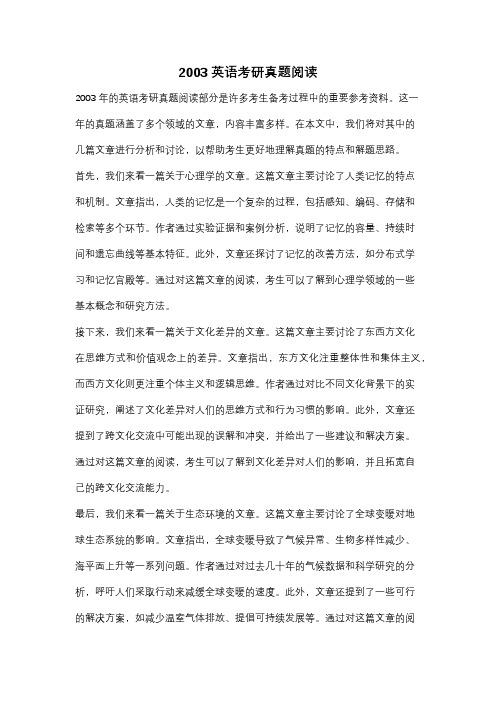
2003英语考研真题阅读2003年的英语考研真题阅读部分是许多考生备考过程中的重要参考资料。
这一年的真题涵盖了多个领域的文章,内容丰富多样。
在本文中,我们将对其中的几篇文章进行分析和讨论,以帮助考生更好地理解真题的特点和解题思路。
首先,我们来看一篇关于心理学的文章。
这篇文章主要讨论了人类记忆的特点和机制。
文章指出,人类的记忆是一个复杂的过程,包括感知、编码、存储和检索等多个环节。
作者通过实验证据和案例分析,说明了记忆的容量、持续时间和遗忘曲线等基本特征。
此外,文章还探讨了记忆的改善方法,如分布式学习和记忆宫殿等。
通过对这篇文章的阅读,考生可以了解到心理学领域的一些基本概念和研究方法。
接下来,我们来看一篇关于文化差异的文章。
这篇文章主要讨论了东西方文化在思维方式和价值观念上的差异。
文章指出,东方文化注重整体性和集体主义,而西方文化则更注重个体主义和逻辑思维。
作者通过对比不同文化背景下的实证研究,阐述了文化差异对人们的思维方式和行为习惯的影响。
此外,文章还提到了跨文化交流中可能出现的误解和冲突,并给出了一些建议和解决方案。
通过对这篇文章的阅读,考生可以了解到文化差异对人们的影响,并且拓宽自己的跨文化交流能力。
最后,我们来看一篇关于生态环境的文章。
这篇文章主要讨论了全球变暖对地球生态系统的影响。
文章指出,全球变暖导致了气候异常、生物多样性减少、海平面上升等一系列问题。
作者通过对过去几十年的气候数据和科学研究的分析,呼吁人们采取行动来减缓全球变暖的速度。
此外,文章还提到了一些可行的解决方案,如减少温室气体排放、提倡可持续发展等。
通过对这篇文章的阅读,考生可以了解到环境保护的重要性,并且了解到全球变暖问题的现状和应对措施。
通过对这几篇文章的分析,我们可以看出2003年英语考研真题阅读部分的内容涵盖了心理学、文化差异和生态环境等多个领域。
这些文章不仅具有一定的深度和长度,还涉及了一些实证研究和解决方案。
对于考生来说,阅读并理解这些文章是提高阅读理解能力和跨学科综合能力的重要途径。
考研英语2003阅读

考研英语2003阅读在2003年的考研英语考试中,阅读理解部分是考查考生语言综合运用能力的重要环节。
该部分不仅要求考生具备扎实的词汇量和语法知识,还要求考生能够快速准确地捕捉文章的主旨大意,理解作者的观点和态度,以及分析文章的结构和逻辑关系。
首先,考生需要对文章的主旨大意进行把握。
这通常可以通过阅读文章的首段和尾段来实现,因为这两个部分往往包含了文章的核心观点。
此外,考生还应注意文章中的转折词,如"however"、"but"等,这些词汇往往标志着作者观点的转变,对理解文章的主旨至关重要。
其次,考生需要理解文章中的细节信息。
这要求考生能够快速定位到文章中的相关段落,并从中提取出关键信息。
在这一过程中,考生可以利用一些阅读技巧,如略读和寻读,来提高阅读效率。
略读可以帮助考生快速浏览文章,抓住主要信息;寻读则可以帮助考生在需要时迅速找到具体的细节信息。
再者,考生需要理解作者的观点和态度。
这通常涉及到对文章中形容词、副词以及情感色彩的词汇的敏感度。
考生需要通过这些词汇来推断作者对某一观点或现象的态度,是支持、反对还是中立。
最后,考生需要分析文章的结构和逻辑关系。
这要求考生能够识别文章中的论点和论据,以及它们之间的逻辑联系。
考生可以通过识别文章中的因果关系、对比关系、例证关系等来理解文章的逻辑结构。
在备考过程中,考生应该通过大量的阅读练习来提高自己的阅读理解能力。
同时,考生还应该注意总结和归纳不同类型文章的阅读策略,以便在考试中能够迅速适应不同风格的文章。
通过不断的练习和总结,考生可以逐步提高自己的阅读速度和理解深度,从而在考研英语的阅读理解部分取得优异的成绩。
- 1、下载文档前请自行甄别文档内容的完整性,平台不提供额外的编辑、内容补充、找答案等附加服务。
- 2、"仅部分预览"的文档,不可在线预览部分如存在完整性等问题,可反馈申请退款(可完整预览的文档不适用该条件!)。
- 3、如文档侵犯您的权益,请联系客服反馈,我们会尽快为您处理(人工客服工作时间:9:00-18:30)。
2003年考研英语真题全面解读之阅读理
解
考研英语阅读和翻译是分不开的,要掌握文章主旨,理解文章内涵,必须要有一定的翻译能力,尤其是面对长难句时,模糊带过往往不能解决问题。
凯程在线带领大家逐句翻译阅读真题,希望大家能够先打好基础,攻克长难句便指日可待。
下面我们来看2003年第2篇第7、8句的翻译。
2003年第2篇第7、8句
Asked if she opposed immunizations, she wanted to know if vaccines come from animal research. When assured that they do, she replied, “Then I would have to say yes.”
词汇:
immunization//n. 免疫接种
vaccine//n. 疫苗
assure//v. 保证,确保;弄清
结构:
Asked if she opposed immunizations(过去分词asked所带的状语,其中还有if引导的宾语从句), //she wanted to know(主句) //if vaccines come from animal research(if宾语从句).
When assured that they do(when引导的状语从句,相当于when she was assured…;后面的that是宾语从句), //she replied, “Then I would have to say yes.”(主句是she relied,后面引号是直接引语)
译文:
问她是否反对免疫接种时,她说想知道疫苗是否来自动物实验。
得知答案是肯定的,她回道,“那我不得不说,是的,我反对”。
翻译思路:补充替代的信息
英语中用do, so等词来作为替代手段,翻译的时候一般需要重复一下前面替代的内容。
一个简单的例子:Whether you believe it or not. I do. 不管你信不信,我信。
在Asked if she opposed immunizations, she wanted to know if vaccines come from animal research. When assured that they do, shereplied, “Then I would have to say yes.”这两句话中,when assured that they do中的do意思是come from animal research, 主语they当然指vaccines。
还有then I would have to say yes中yes之后包含的意义是:Yes,I oppose
immunization.。
翻译的时候,需要重复一下,把中文逻辑说清楚。
今天的作业:
考研阅读逐句翻译2003年第2篇第9句和第10句Asked what will happen when epidemics return, she said, “Don’t worry, scientists will find some way of using computers.”Such well-meaning people just don’t understand.。
